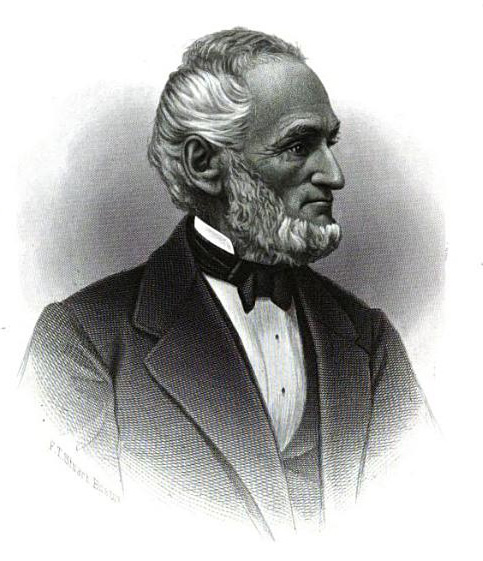| Profile | Major Works | Resources |
Amasa Walker, 1799-1875.


Massachusetts businessman, politician and educator. He was the father of Francis Amasa Walker.
Amasa Walker was born in the village of Woodstock, Connecticut, the son of a blacksmith. Shortly after his birth, the Walkers relocated to what is now North Brookfield, near Worcester, Massachusetts. A sickly child, Amasa Walker would be plagued by health problems all his life. He received a modest education at the local village school, while working on his father's farm, and subsequently worked as a clerk in several nearby stores. In 1817, Amasa Walker enrolled in Amherst College, but was forced to withdraw for health reasons.
In 1820, Amasa went into business as a shopkeeper in West Brookfield. In 1823, he divested from the store, and became an agent of a manufacturing company in Methuen. In 1825, Amasa Walker moved to Boston, opening a business there. He would rise to become a successful shoe manufacturer. Amasa also became a bank director and was a keen railroad promoter, serving as director of the Western Railroad connecting Boston to Albany in the 1830s, and heavily promoted a scheme to build a railway between New England and St. Louis, Missouri. The Panic of 1837 ravaged his businesses, and another bout of ill-health, forced Amasa Walker to retire from business in 1840 at the age of 41.
The Panic of 1837 had turned Walker's attentions to economics. After retiring from his business activities, Walker became a college teacher, lecturing on political economy at Oberlin College in Ohio from 1842 to 1848, before getting more heavily involved in local Massachusetts politics. Amasa Walker was a prominent abolitionist, and one of the founders of the Free Soil party in 1848 and was elected that same year to the Massachusetts state legislature. He went as a delegate to the international peace conferences in London in 1843 and Paris in 1849. Walker later served as Secretary of State for the Commonwealth of Massachusetts in 1851-53. From 1853 to 1860, Walker was an outside examiner in political economy at Harvard. Between 1854 and 1869, Walker lectured at Amherst College.
During this period, Amasa Walker wrote extensively in the commercial press of the day. An ardent Jacksonian, Walker had promoted the sub-treasury system. In 1857, Walker began to contribute a series of articles on political economy to Hunt's Merchants' Magazine, evidently based on his college lectures. His series had only just reached the topic of money when the Panic of 1857 hit. Walker's articles, transformed to address the crisis, his public call for suspension of convertibility to save Boston banks, and a small tract on money published that same year, cemented Walker's reputation as a leading expert on financial matters. Amasa Walker became the pre-eminent American advocate of the "Currency School", and urged a 100% gold reserve requirement for banknotes.
Walker continued lecturing at Amherst, interrupting for a brief stint in the House of Representatives in 1862-63 during the Civil War. After the war, in 1866, Amasa Walker published his Science of Wealth, his principal work, centered around his currency ideas and channeling the laissez-faire traditions of French liberal school into early American economics. It became a successful textbook, and went through many editions. Amasa Walker's economic ideas would be carried onwards by his son Francis Amasa Walker.
|
Major Works of Amasa Walker
|
|
HET
|
|
Resources on Amasa Walker
|
All rights reserved, Gonšalo L. Fonseca
